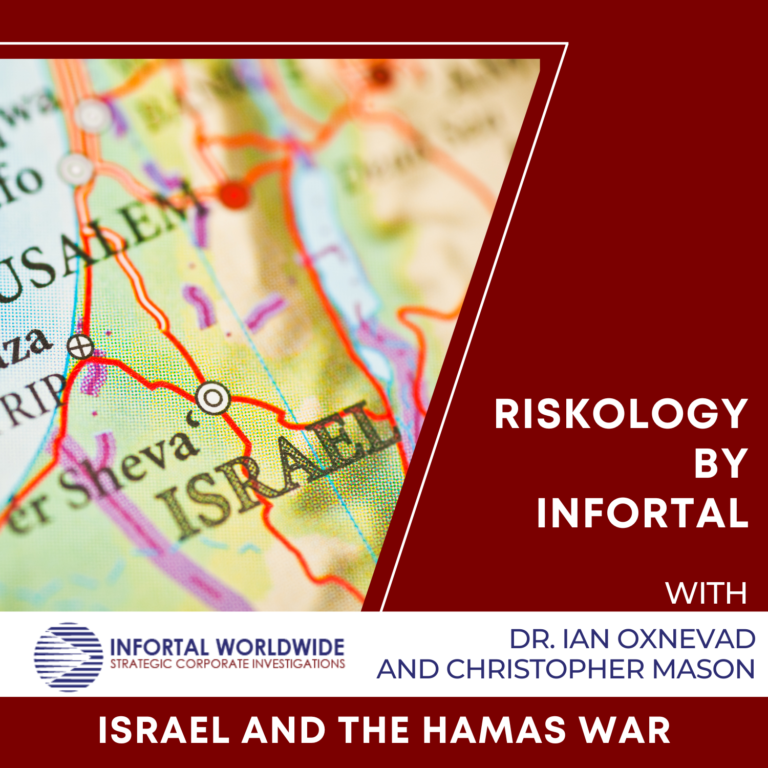The rapidly changing landscape of the Middle East has profound implications for businesses in the region. In this episode of Riskology by Infortal, Chris Mason and Dr. Ian Oxnevad explore the geopolitical shifts and emerging power dynamics that are creating a new Eurasian battleground. They emphasize the need to understand this broader context, moving beyond the traditional Israeli-Palestinian lens to explore the multifaceted relationships shaping the region. The ongoing conflict unravels as a manifestation of this complex geopolitical puzzle.
Infortal Worldwide is a global risk management and investigations firm that specializes in helping businesses navigate complex risk landscapes. The company focuses on various areas, including economics, politics, and geopolitical risk. By delving into these interconnected realms, Infortal Worldwide aims to provide clients with comprehensive insights that empower them to make informed decisions, especially in critical areas such as mergers and acquisitions, private equity investments, and other strategic moves.
You’ll hear Chris and Ian discuss:
- The traditional view of the Middle East has evolved significantly over the past decade, moving beyond Western counterterrorism narratives. The dynamics now involve a broader struggle for control in Eurasia, with China, India, and Russia asserting their influence.
- The significance of the Abraham Accords: there is a paradigm shift where Sunni Arab nations in the Persian Gulf view Israel not only as part of the Middle East but also as crucial for future prosperity.
- The emergence of higher-tech Sunni Arab nations aligning with Israel poses a threat to groups like Hamas and indirectly challenges initiatives such as China’s Belt and Road.
- Israel’s strategy in dealing with Gaza could influence the magnitude of the conflict. The potential involvement of Iran and the risk of destabilization in the region are examined.
- Despite the focus on advanced technology, the conflict witnesses the use of low-tech tactics by groups like Hamas.
- Cryptocurrency may be used by groups like Hamas to finance terrorism. Its liquidity and relative untraceability make it an efficient tool for terrorists to move value quickly.
- Ian highlights the challenge of tracking funds that can originate from legal sources like humanitarian aid or business activities.
- Terrorist organizations have used different money laundering methods over time, including unconventional methods such as toys. Cryptocurrency is the modern iteration of money laundering, offering unique advantages like holding value and quick, untraceable transactions.
- Chris highlights the importance of robust compliance programs for financial institutions facilitating fund transfers.
- Ian outlines various business risks resulting from the conflict, including:
- Expanded counterterrorism financing regulations are anticipated.
- Civil suits may arise under counterterrorism financing laws, making financial institutions liable.
- Consumer boycotts and sanctions on actors like Hamas and Hezbollah are expected.
- Humanitarian sides of organizations may face sanctions.
- Heightened insurance and security costs.
- Potential global economic impacts may include:
- Inflationary pressures are expected due to conflict demands, humanitarian assistance, and rebuilding costs.
- Supply chain disruptions are likely, especially if key infrastructures like the Suez Canal or Straits of Hormuz are affected.
- Oil production disruptions in the Middle East could lead to a global rise in oil prices, impacting businesses globally.
- As such, businesses must plan strategically by ramping up security costs and intelligence spending.
KEY QUOTES
“I think the first thing everybody needs to understand is that the Middle East from ten years ago no longer exists.” – Dr. Ian Oxnevad.
“Terrorists are very good at this, moving value from place to place. In the past, they used toys, of all things, to get the money to build weapons. What they did was they had trade-based money laundering. …. It’s about laundering the value. And unfortunately, that can consist of anything… Crypto is nice because crypto can hold value, especially if you’re talking about Bitcoin, and it can be relatively untraceable. And at the same time, it’s very liquid. You can send it like cash, unlike trade-based money laundering. So in that sense, you can move a lot of value very quickly…” – Dr. Ian Oxnevad.
“Energy is going to become a big deal, especially if the conflict widens, because if conflict emerges with Iran, it’s going to affect the Gulf states as well, which produce oil, and that’s going to potentially disrupt all production in the Middle East. And what you’re going to see there is you’re going to see oil potentially skyrocket, especially if Russian oil and energy is already cut off, and that’s going to have a massive inflationary pressure.” – Dr. Ian Oxnevad.
Resources
Dr. Ian Oxnevad on LinkedIn
Chris Mason on LinkedIn






